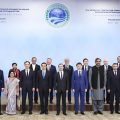
Manufacturing activity of Chinese enterprises gathered speed in March, indicating that the nation’s economy continued to maintain momentum in the first quarter of this year, latest data said.
The Caixin China manufacturing PMI for March released on Monday showed that the index dropped by 0.6 percentage point from the previous month to 51, but was still well above the 50-point mark that separates growth from contraction on a monthly basis. However, the reading was the lowest during the past four months.
Despite the slightly weakening demand, manufacturers still remained upbeat on business prospects for the rest of the year, with the industrywide confidence hitting the highest point in a year. Expectations are rife that the expansion of production will be facilitated by stepped-up investment, improvement in market expectations and the launch of new products.
The Caixin manufacturing PMI, a private survey on China’s manufacturing activity, covers more than 400 small and medium-sized enterprises, whereas the country’s official manufacturing PMI mainly covers more than 3,000 large and medium-sized companies, including State-owned enterprises.
The official manufacturing PMI for March increased by 1.2 percentage points from the previous month to 51.5, showing a steady and rising trend of the manufacturing industry, the National Bureau of Statistics announced on Saturday.
As production activities in the country accelerated after the Lunar New Year, the production index, a sub-index of the official PMI, rose by 2.4 percentage points month-on-month to 53.1 in March. The new orders index also went up by 2.3 percentage points to 53.3, said Zhao Qinghe, a senior statistician of the National Bureau of Statistics.
Due to improved international trade, the new export orders index and the import index both reached 51.3, up by 2.3 percentage points and 1.5 percentage points respectively.
The indexes of the equipment, high-tech and consumer product manufacturing were all above the average level of the manufacturing industry. It shows that the deepening of China’s supply-side reforms has accelerated the fostering of new drivers for economic growth and has led to further enhancement of the quality of supply, Zhao said in an article posted on the website of the NBS on Saturday.
Apart from the manufacturing PMI, the non-manufacturing business activity index also increased by two basis points month-on-month to 54.6 in March.
“Both the manufacturing and non-manufacturing indexes rebounded as expected this month, showing a good momentum of economic operation currently. The rise in PMI was driven by seasonal factors and a pickup in external demand,” Liu Xuezhi, a senior macroeconomic analyst at the Financial Research Center of the Bank of Communications Co Ltd, said in a research note.
“As recent trade frictions between China and the US may escalate, the export situation remains uncertain for China. We need to pay continuous attention to the impact of trade frictions on the trends of PMI,” Liu added.


